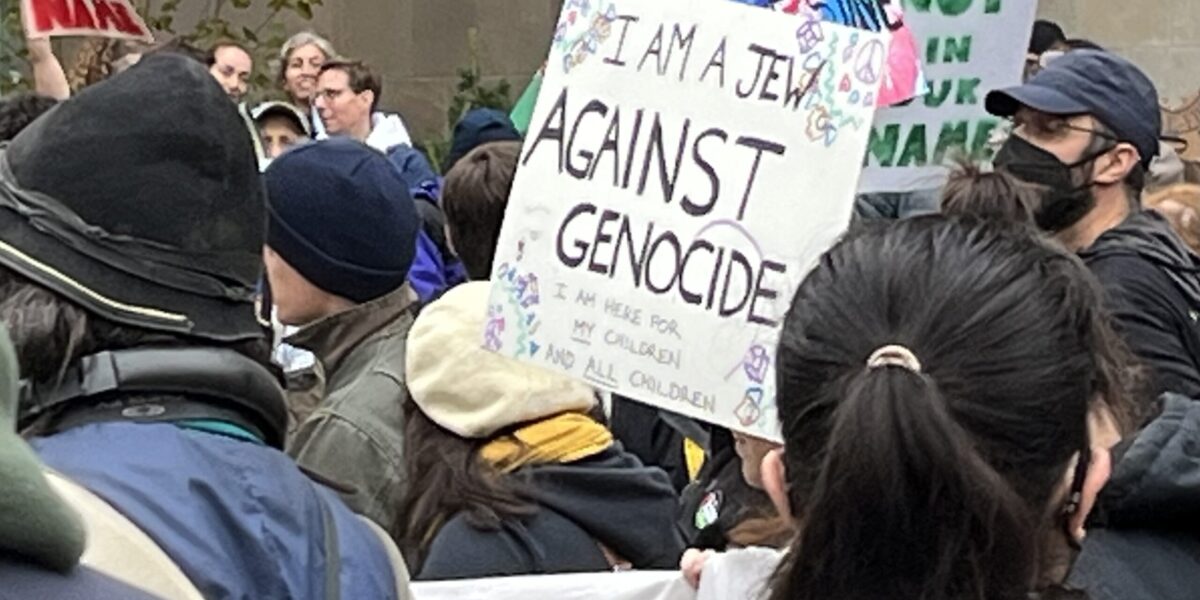As Jews growing up in Canada, Israel held an outsized place in our lives. Israeli flags flew at synagogues we attended, we were encouraged as teenagers and young adults to go on trips to Israel, and endless stories (including the bestseller Exodus, by Leon Uris) positioned Israel as the vehicle that ensured Jewish safety.
Today, many Jews face a crisis over how we hold Israel in our thoughts and how we hold Israel to account. It’s brutally apparent that the narrative of Israel as a moral, scrappy, Middle Eastern beacon has come to an end. The Israel we now see is defending itself against charges of genocide at the International Court of Justice and is using its power to kill and starve Palestinians in Gaza.
Around us, most Jewish institutions are either playing it safe by going on with business as usual or defending Israel’s actions and attacking anyone who dares to criticize it. We understand that for some, the defensiveness is rooted in trauma that was reawakened by the brutal October 7 Hamas attack.
But we believe we can do better.
As youth, we had drilled into us the idea that the Holocaust happened because of, in Hannah Arendt’s words, the “banality of evil” — the complicity of those who saw what was happening but did not speak out against it.
Some Jews might feel that refraining from criticizing Israel is a means of protecting ourselves. But isn’t it also possible that our current collective refusal to publicly condemn Israel’s illegal occupation, war crimes, oppressive state policies and horrific killing of innocent people is inadvertently fueling the rise of anti-Jewish sentiments? (Some organizations, such as Jews Say No To Genocide and If Not Now are actively speaking out, but they are in the minority.) It’s hard not to interpret Jewish institutional silence as disregard for the lives of Palestinians.
Israel seems to be indignant about the constant barrage of condemnations from around the globe. But could it shrug off voices from the Jewish diaspora if they delivered a clear message that the country no longer has carte blanche?
In addition to speaking up, Jewish institutions need to rein in the self-defeating impetus of decrying all criticisms of Israel and expressions of Palestinian solidarity as anti-Semitic.
We believe that showing up alongside our Palestinian colleagues, friends and neighbours and their allies is a far more effective way to combat anti-Semitism than to decry the rallies as anti-Semitic hotbeds. We’ve attended many of these rallies together — two Jews self-identifying through tuques and placards among many Jews taking to the streets to cry “Not in our name!”
In Judaism, a foundational principle is tikkun olam: the duty to repair the world and make it better.
While we recognize the complexities of the situation, we hold strong to the belief that our freedom and security are bound to the freedom and security of the Palestinian people, and our silence in this moment harms us all. In a podcast interview, writer Naomi Klein speaks to the violence taking place: “As a Jewish person, that is what the ongoing and escalating horrors in Palestine show me. In attempts to banish and destroy the body of the other we, we as Jews end up destroying ourselves, if not our bodies, then our spirits, our principles, our love of debate, our elastic identities, our souls if you believe in that kind of thing.”
The actions of the Israeli government are tearing the world apart. We must show up to repair it — as Jewish institutions and as Jewish individuals.



